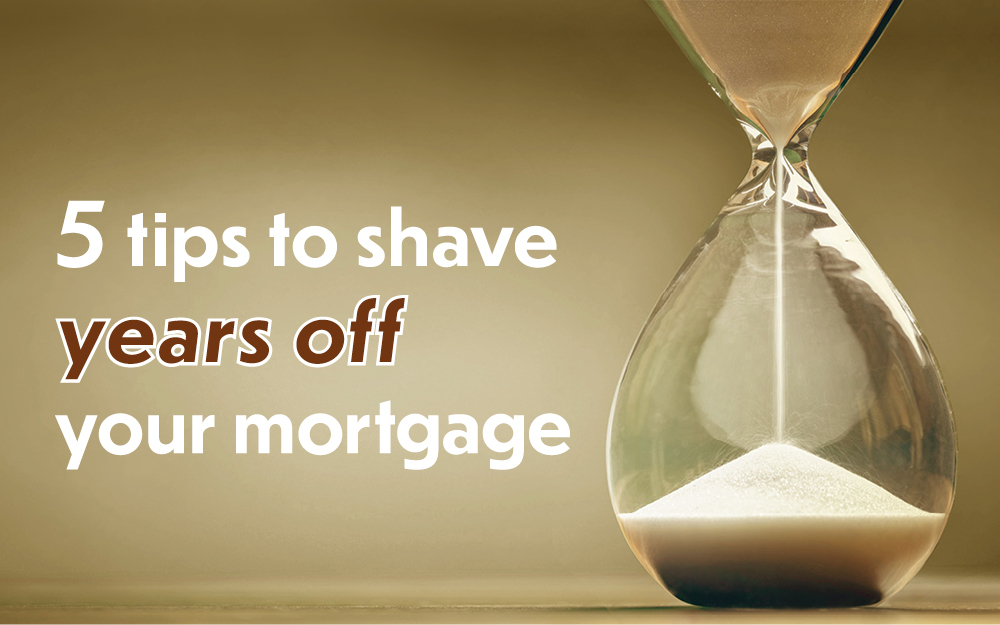ACT’s Professional Advantage: Save $70,000+ in Australia’s Most Stable Market
The Australian Capital Territory offers first home buyers a unique combination of Australia's most stable employment market and strategic...

Every homeowner loves the idea of becoming mortgage-free faster and paying less interest in the lead up to that landmark event. Fortunately, there are some easy steps you can take to get there sooner – whether you’ve just got your first home loan, want to increase your property equity or become mortgage-free as soon as possible. Let’s go over them.
First up, switch to an interest and principal repayment loan. Paying just the interest may be great for your immediate cash flow but it is only kicking your principal repayment down the road. Your principal does not reduce during the interest-only period of your mortgage. This means your debt isn’t going down and you end up paying more interest. Interest-only loans tend to be at higher rates as well, so as soon as you can afford it, get in touch to make the switch.
Move to fortnightly or weekly repayments. While there are 12 months in a year, there are 26 fortnights, not 24. So, by paying every two weeks, you’ll be repaying an extra month every year – enough to help you get mortgage-free a few years earlier.
Keep a look out for a better rate. It’s a good idea to check in with us to review your current interest rate, to ensure it still works for you and is competitive. We can work out what features of your current loan you want to keep and compare the interest rates on similar ones. If there’s a better rate somewhere else, we can ask your lender to match it or offer you a cheaper alternative before making the move.
Increase the amount you pay whenever you can. Anything extra you pay reduces your interest repayments and shortens the life of your loan. Since most of us don’t miss what we don’t see, automatically rounding up your repayments is a painless way to do this. For example, you could round up to the next hundred. If you pay $850 every fortnight, make it $900. That’s $1300 a year off your principal and therefore lower interest repayments every month.
Try to stick to the same repayment amount even if you switch to a lower interest rate. If you keep making the higher payments, you’ll be repaying a little extra every time. Say your minimum repayment goes from $1000 a fortnight to $800. Keep paying the $1000 a fortnight and you’ll be taking an extra $5,600 off your mortgage every year. And with interest rates always threatening to change, it’s a good idea for us to periodically check you’re on the best split of fixed and variable rates for your circumstances too.
Get an offset account and make the most of it. This savings or transaction account links to your mortgage with the balance reducing your mortgage by the same amount. Interest is calculated daily, so every day your money is in your offset will help lower your principal and therefore interest repayments. And don’t forget that your mortgage interest rate will always be higher than the rate you earn in a regular savings account, so it can be a good idea to keep all your savings – as well as your salary – in your offset account.
Compared to the size of the average mortgage, all these steps may seem like they’re making only a tiny difference to your debt. However, over the life of your mortgage and when combined, they can add up to significant savings on interest repayments and the length of your loan.
If you’d like help planning or implementing the best combination of mortgage reduction strategies for you, please get in touch. You could be living mortgage-free a lot sooner than you think.

“So many things to choose from but at the end of the day, Christmas is about relaxing and indulging in tabloid magazines. After a year of reading property, finance and business magazines I look forward to the break.” Jane Slack-Smith
Canstar asked me and 7 other money experts to share what we were hoping Santa will bring us this year. Here’s what we had to say:
Click here to read the article

“What if Christmas, doesn’t come from a store. What if Christmas…perhaps…means a little bit more!” ― Dr. Seuss
Here in Australia we have a lot to celebrate and be thankful for this year. After a tough couple of years of pandemic-induced uncertainty, we are opening up with travel back on the cards, we can also catch up with friends and family and we have a path back towards normality. As the festive season approaches, we may also need to consider how this celebration too might change.
It hasn’t all been doom and gloom. Gratitude has been a real focus to the year, and as a result many people are shifting away from the silly season’s materialism and excess to reassess what Christmas means to them.
Our “new normal” festive season can be one that is memorable and joy-filled, whether you celebrate this holiday or just enjoy unwinding at the end of the year.
Being thankful for what we have is important; especially so in a year in which bad news may have overpowered the good.
Rather than merely being a buzzword, gratitude has been shown to reduce depression, anxiety, and stress. Whether it’s around the table at Christmas or in the lead up to the holidays, tell your loved ones what you’re thankful for, as this can inspire them to also reflect on this. It can also help reframe the year from being one of hardship to also having contained moments of happiness and opportunities.
As many of us have been separated from loved ones due to restrictions, the holidays provide an opportunity to reconnect in person. While for many of those who experienced prolonged lockdowns it’s exciting to plan a family road trip or a big indoor gathering, what truly matters is the time you spend with those you care for.
Perhaps even new traditions can be formed as you create memories together. Rather than focussing on the presents around the tree, maybe celebrate being in the presence of those you care about and make the festive season about wonderful, shared experiences.
Christmas time is synonymous with extending goodwill to all – and this year there are more people who are doing it tough as a result of the pandemic and many businesses who are struggling to get back on their feet.
Give a helping hand to those who have fallen on hard times by volunteering some of your time to a worthy cause (such as a free meal service to those in need) or donating money if you’re able to. These gestures can also reaffirm your understanding of what you have to be thankful for.
Being thoughtful about supporting businesses that have been doing it tough, can also make a big difference.
Retail sales over the festive season are predicted to boom, with overall spending estimated to come in at $58.8 billion, as we open our pockets and spend, spend, spend. This represents an increase of 11.3% on pre-pandemic conditions.i
While it’s thrilling to be hitting the shops, it’s important to watch what you are spending. Manage your festive shopping spree by setting and then sticking to a budget. Don’t leave gift buying to the last minute when you’re more likely to miss bargains or to panic buy. Also keep an eye on your credit card use, or buy-now-pay-later schemes so you don’t have a debt hangover in the new year to worry about.
As this year wraps up, we would like to express thanks for your support during 2021 and wish each and every one of you a safe and happy holiday season.
I think for a first time investor, don’t get caught up in the hype of ‘I have to buy a property’. Don’t get caught up in the hype of ‘everyone’s doing it. I’m being left out.’
Be strategic about it!
Understand what you want to achieve and then understand the strategy that is going to get you there. And I think that’s going to be the best thing that that any first time investor can do and then take action.
Educate yourself and take action.
If you’d like to know more about the buying process. Don’t make the common mistakes that could cost thousands of dollars.
Download the ebook buying process https://investorschoice.com.au/buying-process/
#buyingprocess #propertyinvestment #firsthome #mortgagebroker
Can you really predict the future growth of a suburb you’re considering?
You may not be able to predict the future, but you can look at certain indicators to get an idea.
Look to the past to get an idea about area growth over the years.
A capital growth for the suburb that is equal or better than the city’s average is a good start.
Also, don’t forget to research all the factors that can impact your property’s future capital growth.
Things like:
Pricing pressure from suburbs closer to the CBD
Growing income in the area, which indicates gentrification
Low vacancy rates and rising rents
New infrastructure
School catchment zones
One of the most common causes of capital growth is the ripple effect.
The ripple effect happens when buyer demand and increased property prices causes a “ripple” outward away from the CBD into other suburbs.
This means that buyers who can’t afford the suburb of their choice, because of price increases look to the next-best suburb.
Often this nearby suburb is lower-priced – until the subsequent demand reaches them.
And then the ripple effect pushes into the next suburb, and so on
Join our First Home Buyer Facebook community to learn more about our framework
https://www.facebook.com/groups/firsthomefirstinvestment/
The Australian Capital Territory offers first home buyers a unique combination of Australia's most stable employment market and strategic...
The Northern Territory offers Australian first home buyers the most generous grant support in the nation, with the HomeGrown Territory...